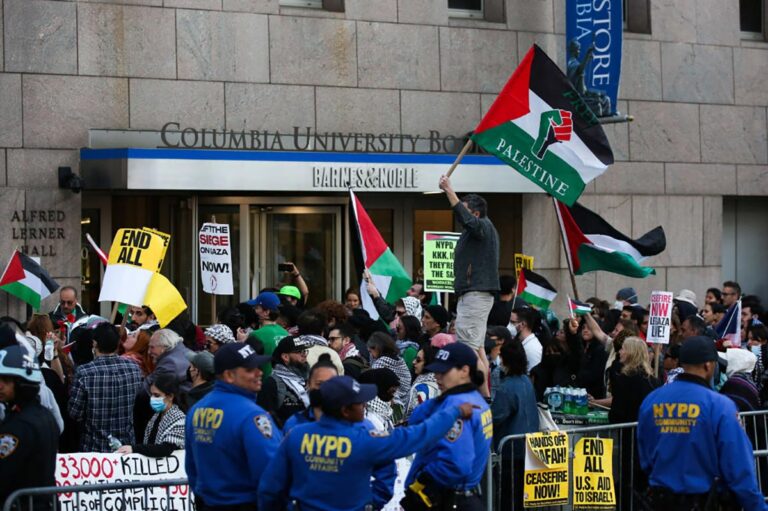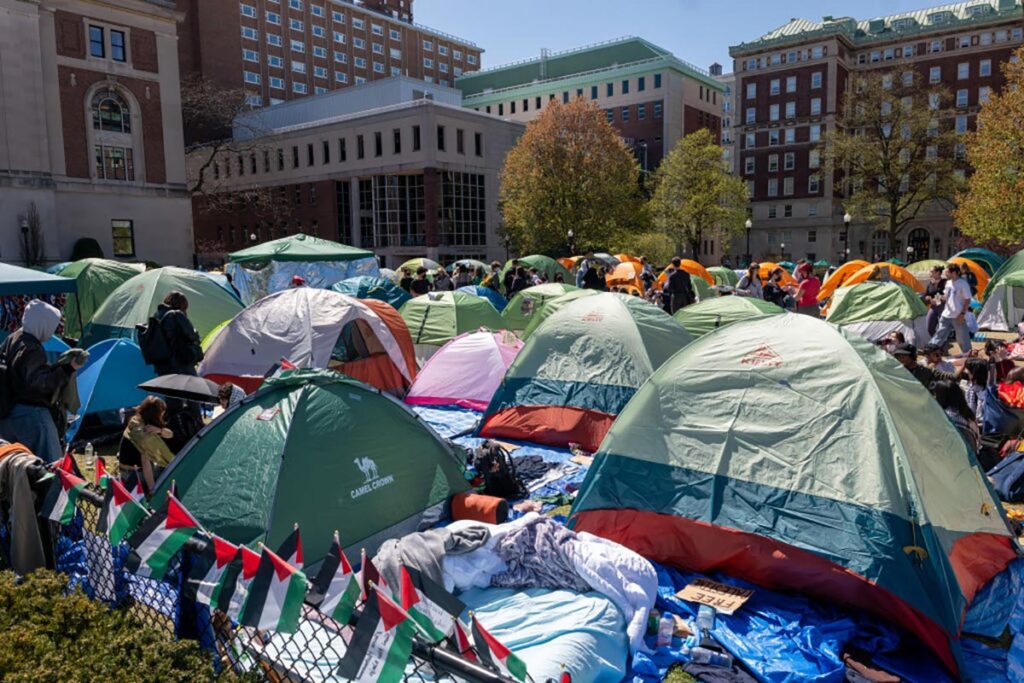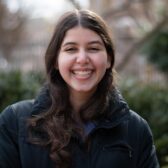
When Columbia University Rabbi Elie Beuchler sent a message this past Sunday to our student group, it changed the course of numerous Jewish students’ residence on campus, including mine. He recommended that we go home immediately.
Many questioned the advice of Rav Elie, as we call him, but I believe he made the right decision. Columbia University is no longer a safe campus for Jewish and Zionist students.
Just one week ago, at the same time that Columbia President Minouche Shafik was testifying about antisemitism to the House Education Committee in Congress, pro-Palestine protesters on Columbia’s campus erected numerous tents on the East Lawn, the central gathering location of Columbia students right by the campus entrance.
Many questioned the advice of Rav Elie, as we call him, but I believe he made the right decision.
They painted a massive tarp declaring it a “Gaza Liberation Zone,” and over 100 students began camping out to demand that Columbia divest its endowment from Israel and end the dual BA program with Tel Aviv University.

The unauthorized protest, the encampment, the occupation — depending on what you call it — overwhelmed the campus with its presence. Day and night, the student protesters chanted slogans to free Palestine, globalize the Intifada, and remove Zionists from campus.
Loud bangs reverberated across campus. Even though they were likely just the sound of drums and chanting, my French Revolution seminar became a lot less about Robespierre and Arendt and much more about anxious thoughts about what was happening on the lawns outside.
Consequently, after 33 hours of the encampment, President Shafik called in the NYPD to arrest those protesters who were occupying the East Lawn.
Surrounding the lawns, additional protesters who were not prepared to get arrested chanted “NYPD, KKK, IOF — they’re all the same,” and screamed “shame” at the police officers. Jaws agape, my friends and I, along with over 1,000 other students, watched 108 of our peers in the encampment get arrested by police in full riot gear.
You might have thought that the arrests, suspensions, ID deactivations, and evictions would have been enough — dayenu, as we recently said at the Passover seder — to deter students from disrupting learning any further. But that wasn’t the case.
Minutes after the arrests and as police began to clear the East Lawn encampment, students who had been shouting on behalf of the arrested students stormed the West Lawn, adjacent to the East Lawn encampment, and started a second one.
The tone of the second encampment was different. The students inside were more passionate, fervent, ideologically inspired. They quickly developed a strong sense of community and shared purpose, creating a daily schedule that included art projects, dance lessons, and poetry readings.
Yet, this fervent sense of purpose masked a more sinister reality. Immersed in their activities, these protesters were blinded to the antisemitism festering around them. While they were visiting their makeshift pharmacy and partaking in multi-faith religious rituals, my friends nearby were being harassed.
On Saturday night, a group of my friends went to the Sundial, a central meeting point on Columbia’s campus in between the two lawns, to celebrate Jewish pride. They danced and blasted “The Star-Spangled Banner,” Israeli music, and “One Day” by Matisyahu.
At this time, I wasn’t at the protest yet; I had only seen a video of a group of pro-Palestine protesters concealed in dark clothing and keffiyehs approaching the Jewish students. In the video, one protester held up a sign that pointed at my friends and proclaimed “Al-Qassam’s next victims,” referring to the military wing of Hamas and essentially calling for Hamas to strike at American Jewish students.
Sensing that something had shifted and feeling a strong need to be with my community, I hurried to the only open gate on 116th and Amsterdam where my friends were waiting.
Amid shouts of “death to the Zionist state” and “we don’t want two states, we want all of it,” we saw outside protesters sneak onto campus through a gap in the gates. We immediately reported to campus public safety that non-CUID holders were sneaking onto campus. The officer gaped at us with wide eyes and did nothing.
So, we approached another group of three campus safety officers, hoping that informing multiple officers simultaneously would prompt a quicker response. Within half an hour, they had barricaded the gap in the gates, but by then, numerous outside protesters had already entered.
To make matters worse, no public safety officer remained to guard the barricade. At 1:30 am, more outside protesters were seen intruding onto campus.
After alerting public safety, we returned to our friends with the flags and music, only to find them engaged in an altercation with a group of anti-Israel protesters.
The masked protesters hurled insults at us, shouting, “Yahoodi, Yahoodi (Jew), f*ck you,” “Stop killing children,” and “You have no culture.” They yelled, “Ya Hamas, Ya habib, strike strike Tel Aviv.” While it is certainly important to demonstrate a proud and consistent Jewish presence on campus, we decided it wasn’t worth it to stay and find out what they would do to us next.
The masked protesters hurled insults at us, shouting, “Yahoodi, Yahoodi (Jew), f*ck you,” “Stop killing children,” and “You have no culture.” They yelled, “Ya Hamas, Ya habib, strike strike Tel Aviv.”
As we tried to leave, they followed us, still yelling slurs and screaming that Zionists had no right to exist. A few protesters ran up to us, spilled water on our backs, and sprinted away. We continued walking. When we got to the gates, we asked public safety to escort us home because protesters were following and harassing us, but they refused and told us to “just keep walking.”
Rabbi Yuda Drizin, the Chabad Rabbi on campus, walked a group of us home while outside protesters shouted “Go back to Poland” in our faces. The rest of my friends were on their own and were accosted on their way back to the dorms; one was even smacked in the face with a heavy backpack.
The next morning, we received the text from Rav Elie advising us to go home for Passover and stay there. Public safety had failed to protect us when we needed them most and the NYPD was nowhere to be found on campus.
Over the next few days, more lapses in public safety occurred. When Aiden Parisi, a student who had been arrested and suspended, snuck onto campus earlier this week, my friend reported it to public safety. An officer went into the encampment to investigate but was immediately surrounded by chanting protesters. The public safety officer gave up and left.
Another time, when a friend of mine alerted public safety that someone without a CUID, suspected of collaborating with Hamas on Oct. 7, had intruded onto campus, the officer responded dismissively, “How do you expect us to find one random guy on campus?” It’s disheartening to see that those tasked with ensuring the physical safety of students are failing to do so. Rav Elie said it best in his text message: “It is not our job as Jews to ensure our own safety on campus.”
The necessary next steps are clear: Reform public safety or get the NYPD on campus. Until the university can ensure the physical safety of its Jewish students, Columbia University remains unsafe.
It’s disheartening to see that those tasked with ensuring the physical safety of students are failing to do so…The necessary next steps are clear: Reform public safety or get the NYPD on campus.
One of the encampment’s main negotiators, Khymani James, has been seen on video saying “Zionists deserve to die” and that we should feel “lucky” that he’s “not just going out and murdering Zionists.” James led a cult-like call-and-response human chain that pushed a Jewish student out of the encampment. His presence on campus poses a danger to all Jewish and Zionist students on campus.
Additionally, some students within the encampment were complicit in inviting Within Our Lifetime, sneaking them onto campus and embracing them with open arms, perpetuating the pervasive antisemitism we’re seeing at 116th and Broadway.
Yet President Shafik and her team continue to negotiate with James and other students in the encampment, only managing to secure minor concessions like the removal of a few tents and a superficial agreement not to use discriminatory language in the encampment.
By engaging in these negotiations rather than decisively removing them, President Shafik is legitimizing the encampment and empowering those who violate campus rules and openly express antisemitism.
We should have seen this coming months ago when the university failed to penalize students for chanting “Globalize the Intifada.” At the time, it seemed only intellectually unsafe — certainly not a reason for arrest — but it has naturally escalated into actual violence today.
Until the university takes effective measures to improve the security on campus, Rav Elie’s warning remains clear: Columbia University is currently not a safe place for Jewish students.
Read more: Yale’s failure to uphold its own free expression policy leaves Jewish students fearful and uncertain
Originally Published Apr 26, 2024 05:27PM EDT
